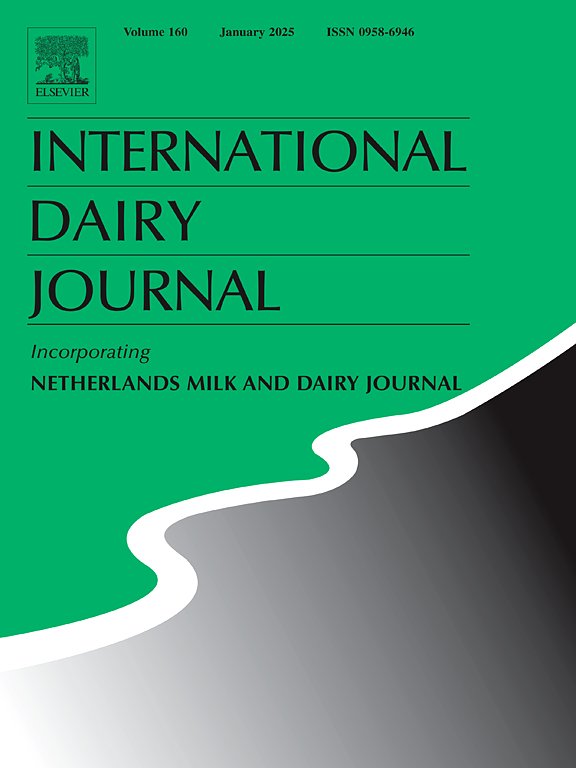Understanding and mitigating adverse biological responses resulting from β-casomorphin-7: Strategies, challenges, and future directions – A review
IF 3.1
3区 农林科学
Q2 FOOD SCIENCE & TECHNOLOGY
引用次数: 0
Abstract
This review provides a comprehensive analysis of the biological effects associated with β-casomorphin-7 (BCM-7) consumption, focusing on mitigation strategies, challenges, and future research opportunities. BCM-7, a peptide derived from the digestion of specific variants of β-casein A1 and A2 found in cow's milk, is linked to a range of health issues primarily due to its interaction with μ-opioid receptors. During digestion, if BCM-7 crosses the intestinal barrier, impacting neurological, gastrointestinal, and immune functions. This review examines the mechanisms underlying BCM-7 formation, including the influence of industrial processes such as pasteurization and fermentation, with particular attention to the β-casein A1 and A2 variants. The reduced potential of β-casein A2 to generate BCM-7 is highlighted, supporting its growing recognition as a healthier alternative. Mitigation strategies discussed include genetic selection for cattle producing β-casein A2 milk and innovative milk processing methods targeting BCM-7 reduction. Enzymatic hydrolysis and fermentation using lactic acid bacteria are emphasized as effective approaches, albeit with economic and technical challenges. Emerging technologies and bioinformatics tools offer the potential to refine peptide profiling and predict allergenic and bioactive characteristics. While substantial progress has been made, continued research is essential to deepen understanding of BCM-7's impact on health and develop precise mitigation strategies.
了解和减轻β-casomorphin-7引起的不良生物学反应:策略、挑战和未来方向综述
本文综述了与β-casomorphin-7 (BCM-7)消耗相关的生物学效应,重点介绍了缓解策略、挑战和未来的研究机会。BCM-7是一种从牛奶中发现的β-酪蛋白A1和A2的特定变体消化而来的肽,主要由于其与μ-阿片受体的相互作用而与一系列健康问题有关。在消化过程中,如果BCM-7穿过肠道屏障,影响神经、胃肠和免疫功能。这篇综述探讨了BCM-7形成的机制,包括巴氏灭菌和发酵等工业过程的影响,特别关注β-酪蛋白A1和A2变体。研究强调了β-酪蛋白A2生成BCM-7的潜力降低,支持其作为一种更健康的替代品日益得到认可。讨论的缓解策略包括生产β-酪蛋白A2牛奶的牛的遗传选择和针对BCM-7减少的创新牛奶加工方法。尽管存在经济和技术上的挑战,但强调利用乳酸菌进行酶解和发酵是有效的方法。新兴技术和生物信息学工具提供了改进肽谱和预测致敏性和生物活性特征的潜力。虽然已经取得了重大进展,但继续开展研究对于加深了解BCM-7对健康的影响和制定精确的缓解战略至关重要。
本文章由计算机程序翻译,如有差异,请以英文原文为准。
求助全文
约1分钟内获得全文
求助全文
来源期刊

International Dairy Journal
工程技术-食品科技
CiteScore
6.50
自引率
9.70%
发文量
200
审稿时长
49 days
期刊介绍:
The International Dairy Journal publishes significant advancements in dairy science and technology in the form of research articles and critical reviews that are of relevance to the broader international dairy community. Within this scope, research on the science and technology of milk and dairy products and the nutritional and health aspects of dairy foods are included; the journal pays particular attention to applied research and its interface with the dairy industry.
The journal''s coverage includes the following, where directly applicable to dairy science and technology:
• Chemistry and physico-chemical properties of milk constituents
• Microbiology, food safety, enzymology, biotechnology
• Processing and engineering
• Emulsion science, food structure, and texture
• Raw material quality and effect on relevant products
• Flavour and off-flavour development
• Technological functionality and applications of dairy ingredients
• Sensory and consumer sciences
• Nutrition and substantiation of human health implications of milk components or dairy products
International Dairy Journal does not publish papers related to milk production, animal health and other aspects of on-farm milk production unless there is a clear relationship to dairy technology, human health or final product quality.
 求助内容:
求助内容: 应助结果提醒方式:
应助结果提醒方式:


